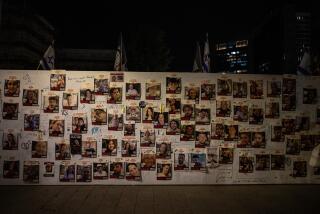Religion Isn’t Sole Motive of Terror
- Share via
What would motivate anyone to crash airplanes into buildings with thousands of people inside?
Attributing religious motivations to the 50 or so people federal authorities report may have been involved in this operation is too simplistic.
Similarly, describing the attackers as crazy does not appreciate the character of their twisted logic. They operated according to a way of thinking that we neither approve nor fully understand, but it made sense to them.
An examination of the motives of the conspirators who sought to bring down the World Trade Center towers in 1993 may offer some insight.
After the bombing in 1993, the bombing conspirators wrote to the New York Times. They justified their attack as a way to transfer the conflict between Israelis and Palestinians to the American homeland and argued that Americans would only diminish their support for Israel when they suffered in the same way as Palestinians and other people like them in moderate Arab countries.
The bombers argued that “the American people must know that their civilians who got killed are not better than those who are getting killed by the American weapons and support.”
The 1993 bombers were also motivated by delusions of grandeur and a sense of moral superiority. They claimed to be engaged in a war against the United States and that hundreds of others would join them in the fight. By casting their actions as part of a broader struggle, they legitimized their attempt at mass murder.
Ramzi Ahmed Yousef, whom U.S. prosecutors described as the mastermind of the bombing, justified the attack as “necessary to use the same means against you because this is the only language which you understand.”
Yousef’s expertise with explosives fed his vainglorious sense of self.
In an interview before his sentencing, Yousef stated that he was a “genius” and an “explosives expert.” Bombers crave the psychic thrill of explosions like arsonists crave fires. By planting a bomb in the underground garage of the World Trade Center, Yousef hoped to establish himself as the greatest bomber in history.
Yousef also justified the bombing as revenge for what he saw as U.S. crimes of history.
In his courtroom statement, he cited the bombing of Japan, the Vietnam War and the trade embargoes against Cuba and Iraq as U.S. acts that warranted punishment. He was historical judge, jury and executioner.
Conspicuous by its absence from the New York Times letter and all Yousef’s statements was any religious justification for the bombing. While some of Yousef’s co-conspirators articulated religious themes in their courtroom declarations of innocence, Yousef’s statements all lacked religious content. Even when he was specifically asked about his religious views, he was evasive. He did not conduct the bombing to achieve religious martyrdom.
Yousef’s words reveal that he was a cold-blooded killer who was proud to describe himself as a terrorist.
The 1993 World Trade Center bombers were motivated by a combination of political, personal and religious notions. Likewise, last week’s attacks as well probably were motivated by more than religion. The suicide hijackers undoubtedly viewed themselves as warriors in a modern crusade against the United States--a much more grandiose characterization than mass murders of innocent people.
Failure to appreciate the complexity of the terrorists’ motivation may cause us to miss important clues that may help round up remaining terrorists and prevent similar attacks in the future.
More to Read
Sign up for Essential California
The most important California stories and recommendations in your inbox every morning.
You may occasionally receive promotional content from the Los Angeles Times.













